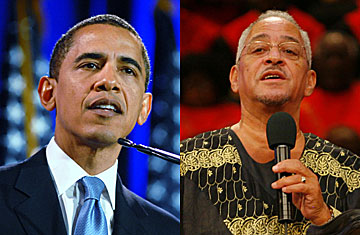
Barack Obama and Rev. Jeremiah Wright
Clarification appended March 27, 2008
The Trinity United Church of Christ vibrated with cheers throughout the four-hour Good Friday service. When the last of seven guest preachers, Rev. Rudolph McKissick, Jr. unleashed his anger against the recent media storm that catapulted Trinity to global notoriety, the crowd rose to their feet. McKissick thundered: "Fox News, CNN, ABC ... they're so stupid that they don't even know the word 'damn' is not a profanity but a Hebraic proclivity, meaning God's curse will fall on all those who defy his love. They know not with whom they are messing. Jeremiah Wright might have retired in body, but just like Jesus, he's coming back more powerful than ever! Damn you! Damn anyone who messes with the anointed." At that, a TUCC member leaned over and said to TIME with a sigh, "Well, I guess that one's on the record."
Pastors and congregation members alike had reason to think that. Media outlets had brought cameras, flashbulbs and crass questions to Trinity's doors for days and shocked the congregation with commentary that branded Rev. Wright Jr. a leader of a "black supremacist cult." The day's overwhelming message: This church will continue its ministry work — no matter who's watching or what they say. And it brought shouts and tears from the pews.
Barack Obama's recent perils were featured in sermons, too. Rev. Lester A. McCorn compared the candidate's recent trials to Michael Jordans performance in the 1997 NBA finals, when the basketball superstar seemed debilitated by fever but nevertheless joined the game and, though sluggish, took the ball with 24 seconds left on the clock and scored the winning three-point shot. "Swish, Barack! You are back in the game!" McCorn shouted to great applause.
The sermons focused primarily on healing wounds inflicted during the past few weeks. "It doesn't matter how anyone portrays you, Trinity," Rev. McKissick continued. "You know who you are. No one can take away your power to write your own destiny." Preachers called out numerous institutions — not just TV networks. African-American rappers that glamorize violence and sexist barbs in the name of "keeping it real" were the subject of vitriolic tirades, too. "Why, they're no better than prosperity-pimping preachers!" shouted Father Michael Pfleger, a popular white Catholic priest, whose messages have raised eyebrows among his own Church's leaders.
Many of Trinity's members live on Chicagos South Side, a vast swath of land that includes the city's convention center, multi-million-dollar mansions in neighborhoods like Kenwood, where Obama lives, as well as boarded-up flop-houses in neighborhoods like Englewood. Among Trinity's members are doctors, architects, prominent journalists, as well as teachers, firemen and garbage collectors. Many residents of the South Sides farthest edges travel to jobs two hours away via public transport: a bus and a train transfer, often through Hyde Park, the leafy, upscale neighborhood best known because of its proximity to the University of Chicago. In recent years, parts of the South Side have experienced the arrival of gleaming condominiums and professionals of all races. Much of the citys bid for the 2016 Olympic Games is centered in Washington Park in the South Side. But historically, city-planning efforts have lagged here. Perhaps the most notorious were the Robert Taylor Homes, prison-like warrens of barred windows, circling police and neglected facilities that finally came down in February 2007. Most of those who died during the 1994 heat wave that killed more than 700 people were South Siders. Before Katrina, it was the deadliest natural catastrophe in the U.S. since the 19th century. The morgues ran out of room. Bodies were piled in milk trucks.
With outreach programs and ministries, Trinity succeeds in providing more for the South Side than any other church, government or private institution. Rev. Luke Watson, another Good Friday speaker, credited Wright for guiding him away from life of crime, which started early with an absent father and a mother addicted to crack. "I was like that thug, the criminal next to Jesus," Rev. Watson said. "I thought, what's that guy doing here? He ain't done nothing. I'm the real sinner." Wright had taught him that God loves sinners, too. "I learned that I wasn't born bad," and then he spoke on the passage in Mark, when Jesus turns to the thief next to him on the cross and says, "Verily ... though shalt be with me." Good Friday marks the holiest day of the year for many African-American Christians, according to Dwight Hopkins, a theologian at University of Chicago's Divinity School. The "strange fruit" that swung from Southern trees bears striking resemblance to Roman crucifixion.
Trinity's own Roman-like architecture is unfamiliar for a church, which might explain why some outsiders found it cultish and strange. The congregation meets in a theater-in-the round, designed after secular buildings like the Parthenon and the U.S. Congress. Stained-glass windows flanking the entrance feature images of African-American leaders, not saints: W.E.B. Du Bois, Malcolm X and Martin Luther King Jr. There is also a glass sculpture of a man resembling Obama. Above it, light streams through block-lettered words: "VOTE. We need YOU." For now at least, Trinity may offer the only refuge for South Siders longing to experience the blessing of democracy.
The original version of this story had a narrow and incomplete description of the South Side of Chicago that omitted mention of recent changes and developments in the area.
